How WhatsApp Business Is Changing the Paradigm of Healthcare Delivery

If one were to consider the tremendous challenges the global healthcare industry faces, then digitalization of healthcare was just a question of when not if. Abysmal doctor-patient ratios in most regions, limited access to care for people living away from major cities, long wait times at clinics, the rising burden of chronic diseases, and an increasingly aging population that needs long-term pharmacotherapy had already put huge pressure on the healthcare infrastructure globally. The Covid-19 pandemic — which severely limited in-person doctor visits at a time when patients were already feeling vulnerable — proved to be the tipping point, necessitating an overnight shift to online healthcare delivery.
Thankfully, technology has helped hospitals and practitioners ramp up their virtual care capacity. Globally, clinics have reported huge increases in online patient registrations, considerably improving accessibility to healthcare for patients. Doctors have been able to attend to more patients in a given time, and patients have been able to access medicines from the comfort of their homes.
Rise of Conversational Messaging in Healthcare
Especially exciting is how conversational messaging technologies, a big hit in sectors like auto, retail, BFSI, and food & beverage, are now being leveraged to provide patient-facing solutions — be it in the areas of appointment scheduling, medicine delivery, sharing of health alerts and lab reports, and so on. Patients today are more empowered than ever before — they can take charge of their health simply by messaging their healthcare facilities. Conversational platforms have benefitted physicians too, who use them to reach out to more patients, share knowledge with peers, and connect with pharma companies that carry out clinical trials and cutting-edge research on new therapies.
WhatsApp Use Cases in Healthcare
WhatsApp has quickly emerged as a critical part of the digital healthcare ecosystem. Its easy-to-use interface, rich messaging features, and the fact that it is already used by over 2 billion people worldwide have made it the platform of choice when it comes to delivering healthcare virtually. The World Health Organization (WHO) launched its health alert on WhatsApp in March 2020. Doctors at the NHS, UK now widely share information on covid and other medical conditions with patients on WhatsApp, and even use it to communicate with other doctors. In Brazil, almost 90 percent of doctors communicate with their patients on the app. Hospitals across the world are encouraging the use of video consultations on WhatsApp to limit in-person clinic visits. As per a recent analysis by Ernst & Young, the number of patients consulting doctors virtually has risen from 28 percent in pre-covid times to 64 percent post-covid. Here we present four vital WhatsApp Business API use cases.
Use Case #1: Booking Appointments
Problems
Patients often find it difficult to book appointments for doctor consultation (be it in a hospital or standalone clinic) from the comfort of their homes. Phone lines are mostly busy and patients are made to hold the line for a long time. Sometimes, timings are not confirmed to them immediately and they have to wait for a callback. Also, they find it inconvenient to reschedule or cancel their appointments. The clinic administration staff also face difficulties in being organized to make timely appointment reminder calls to patients or communicate changes in the doctor’s schedules. Manually entering the patient’s details, such as their names or phone numbers, also results in errors in entry that prevent clinics from connecting with patients in times of need. This creates inconvenience for both parties.
Solution
To get patients to opt-in on WhatsApp so that they can schedule appointments on WhatsApp. Patients can type in details such as their names, age, addresses, etc. by themselves, which reduces chances of incorrect details being entered. The opted-in WhatsApp number also gets auto-linked against the patient record, so there’s no chance of a wrong phone number being saved by the clinic. Clinics can send confirmations, reminders, and other appointment-related updates on the app. They can also set auto-triggers in the software to share timely reminders about upcoming appointments, which reduces no-shows.
Benefits
- Improved adherence to appointment schedules
- Increase in patient’s accessibility to healthcare
- Better patient communication and patient experience
- Reduced workload for administrative staff
Engaged Audience
- Patients who find it inconvenient to travel due to physical limitations, e.g., elderly patients
- Patients who live far away from the clinic and want to book appointments
- Relatives or family friends booking appointments on behalf of patients
- Existing patients booking follow-up appointments
- New patients booking appointments for the first time
- Patients who want a second opinion and want to share scan and test reports with the doctor
Onboarding Framework
Existing or new patients who want to book an online appointment
| Customer Need | To enable patients to book appointments remotely and online |
| Communication Intent | To help the patient book, reschedule, and cancel appointments easily on their WhatsApp; to enable clinics to send them timely reminders and communicate changes in the doctor’s schedule |
| Channel | WhatsApp Business |
| Type of Communication | Two-Way |
| Mode of Communication | Fully automated messages; or automated as well as live agent support over messaging |
| Trigger Messages | 1 day before appointment, 5 hours before appointment, 2 hours before appointment |
| Conversion Goal | Appointment bookings, WhatsApp Opt-In |
| edna Features Implemented | Onboarding flow with customer journey orchestration, WhatsApp Business API, edna chat center |
| Systems Connected | Patient Management Software, Patient Data Management Systems, BOT Platform |
Appointment Booking Examples
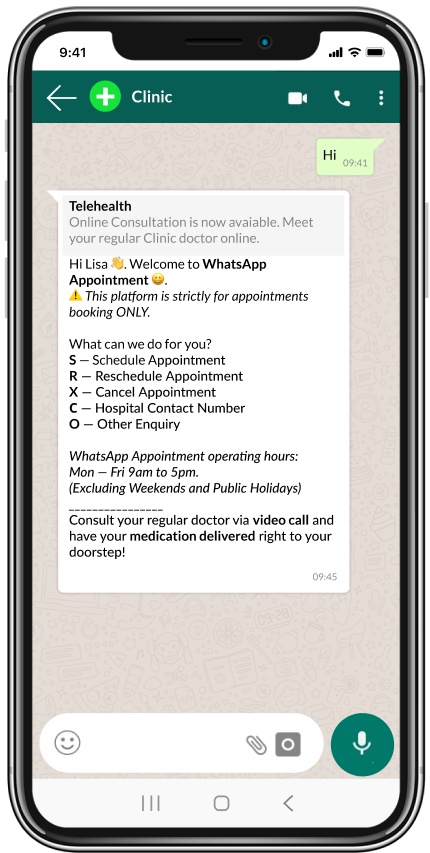
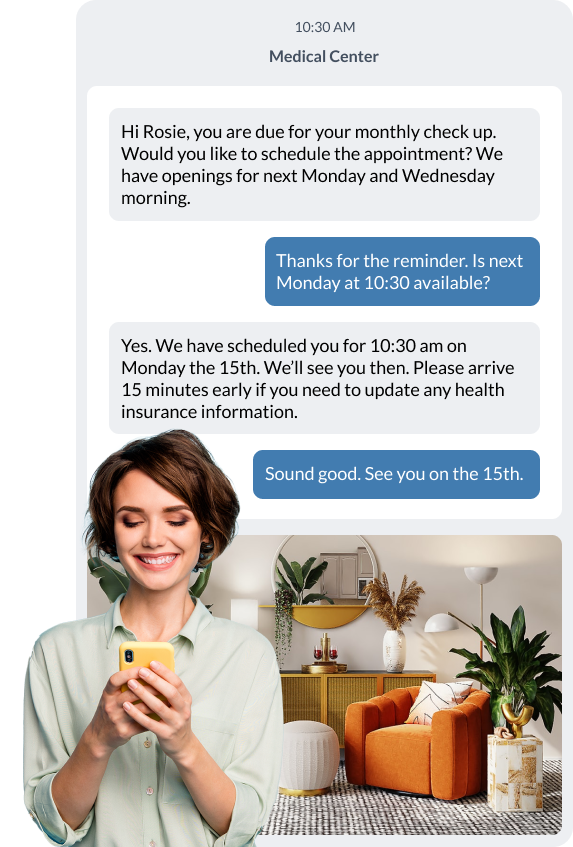
Use Case #2: Ordering Medications from Pharmacy
Problems
Many elderly and ailing patients often need lifelong medications for chronic conditions such as diabetes, high blood pressure, etc. Some also suffer from mobility issues. Such patients find it difficult to go out and purchase medicines by themselves and depend on pharmacies to have them delivered at their doorsteps. However, difficulties arise in ordering these medicines, as the patients are expected to share their prescriptions with pharmacies and this is simply not possible over a call. Also, they might make mistakes while sharing their exact locations, which makes it difficult for pharmacies to reach out to them. What’s more, elderly patients are often concerned about the side effects of medications and want to discuss these with the pharmacist, which is not convenient over the phone. Another problem is that many a times, pharmacies have limited inventory and cannot provide medicines to patients who suddenly turn up.
Solution
To get such patients to opt-in to receive WhatsApp messages from the pharmacy, so that they can easily share images of their prescriptions with a single click. Pharmacies can verify the prescriptions, check stock availability, and message back details of when they will deliver the medications. They can also share easy-to-read lists of possible side effects and drug interactions of the medicines on WhatsApp. They can perform additional services like sending timely reminders on WhatsApp to encourage patients to take their medications on time, increasing compliance. Also, when patients send in requests for medicines on WhatsApp ahead of time, pharmacies can also stock up accordingly, leaving little to no scope for out-of-stock medicines.
Benefits
- Additional business opportunity for brick-and-mortar pharmacies
- Efficient inventory planning
- Enhanced service offerings
- Monitoring of patient data that helps governments plan public health policies
- Easier access to medications for patients
Engaged Audience
- Elderly patients who can’t travel to the pharmacy due to old age or disabilities
- Other patients who have been advised by doctors not to step out due to the pandemic
- Patients who are on monthly subscription medications
Onboarding Framework
Existing or new patients who want to order medicines from a pharmacy online
| Customer Need | To facilitate ordering medicines or other medical equipment from a pharmacy over an effective online channel |
| Communication Intent | To help patients share prescriptions and their addresses (via location sharing) easily on WhatsApp; to enable clinics to confirm deliveries, share drug-related information, and send them reminders to take medicines on time |
| Channel | WhatsApp Business |
| Type of Communication | Two-Way |
| Mode of Communication | Fully automated messages; or automated as well as live agent support over messaging |
| Trigger Messages | Once or twice daily reminders asking patients to take medicines; monthly prescription reminders for re-ordering |
| Conversion Goal | Orders, WhatsApp Opt-In, and Segmentation |
| edna Features Implemented | WhatsApp Business API, edna chat center |
| Systems Connected | Pharmacy POS System, Medical Inventory Software Pharmacy POS System, Medical Inventory Software |
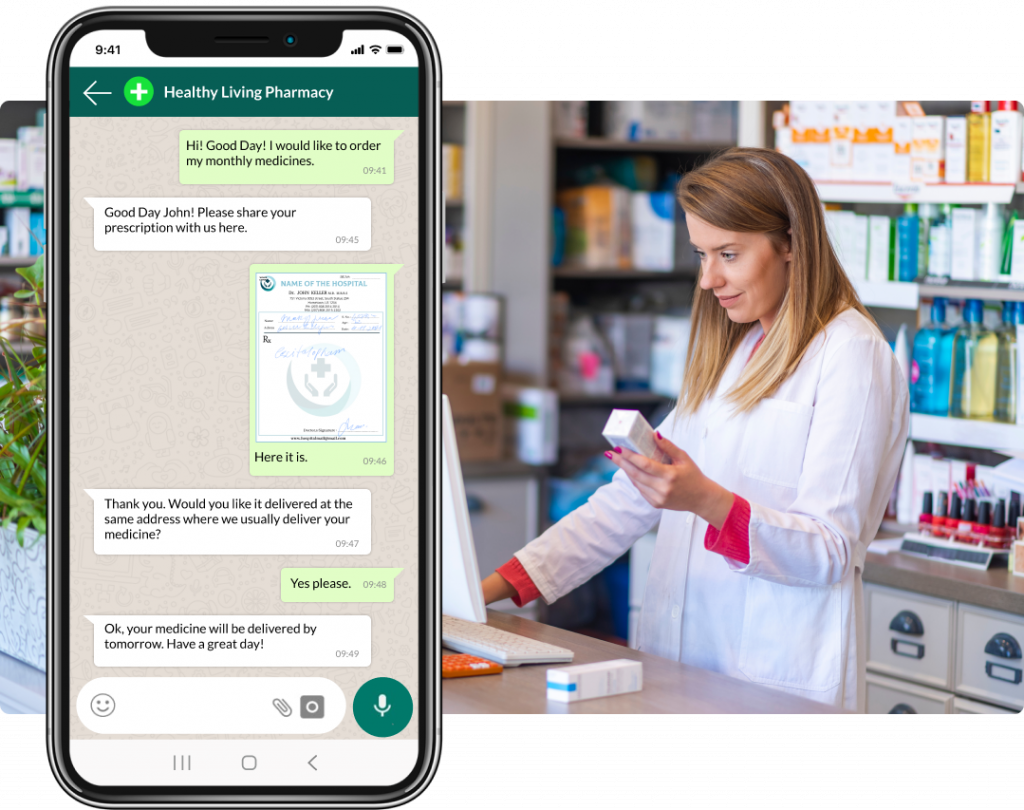
Use Case #3: Clinical Trial Monitoring
Problems
Traditional clinical trials are site-centric and pose challenges for participants as well as study teams to share data seamlessly. Clinical trials involve close monitoring, for example the participant’s daily blood pressure, heart rate, sleep patterns, medicine side effects, water intake, etc. Participants need to share this data with their research teams on a regular basis but find it cumbersome to do so on phone, SMS, email, or other such channels. Teams also need to share trial-related information with participants and the latter often find it difficult to follow instructions over phone calls. Many hard-to-reach groups do not want trials to be intrusive to their daily lives and either don’t join or withdraw consent to participate midway, creating problems for trial teams besides limiting diversity.
Solution
To get trial participants as well as research teams to start communicating over WhatsApp. Both parties can leverage the platform to share all trial-related data seamlessly. Research teams can share educational material such as videos, website links, brochures, etc. to help participants understand what they will be required to do during trials. Two-way communication will enable both sides to reach out as necessary. Participants can be recruited remotely by sharing eligibility details and can share consent on WhatsApp. Also, participants can conveniently share all trial-related data, such as health indicators, symptoms, and side effects of a trial drug on the app in real time. Information shared on WhatsApp is more effectively consumed by participants as compared to that shared over emails. Research teams can also suggest interventions quickly on the app, ensuring participant safety and reducing drop-out rates.
Benefits
- Increased recruitment rate and diversity
- Seamless data sharing over longer spans
- Real-time reporting of adverse events
- Interactive participant management
- Improved trial efficiency
- Remote conducting of trial without need for in-person visits
Engaged Audience
- Trial participants from different geographic locations
Onboarding Framework
Existing or new participants who want to be part of a clinical trial
| Customer Need | To increase participant adherence to the trial through effective communication |
| Communication Intent | Recruit participants remotely; help participants share daily health data and report adverse effects; send them timely reminders |
| Channel | WhatsApp Business |
| Type of Communication | Two-Way |
| Mode of Communication | Fully automated messages; or automated as well as live agent support over messaging |
| Trigger Messages | Daily reminders based on reporting requirements |
| Conversion Goal | Complete reporting of all expected health indicators by all participants |
| edna Features Implemented | Automated communication flow, edna WhatsApp Business API, edna chat center |
| Systems Connected | Clinical trial management systems, WhatsApp Business API, bot platform, edna chat center |
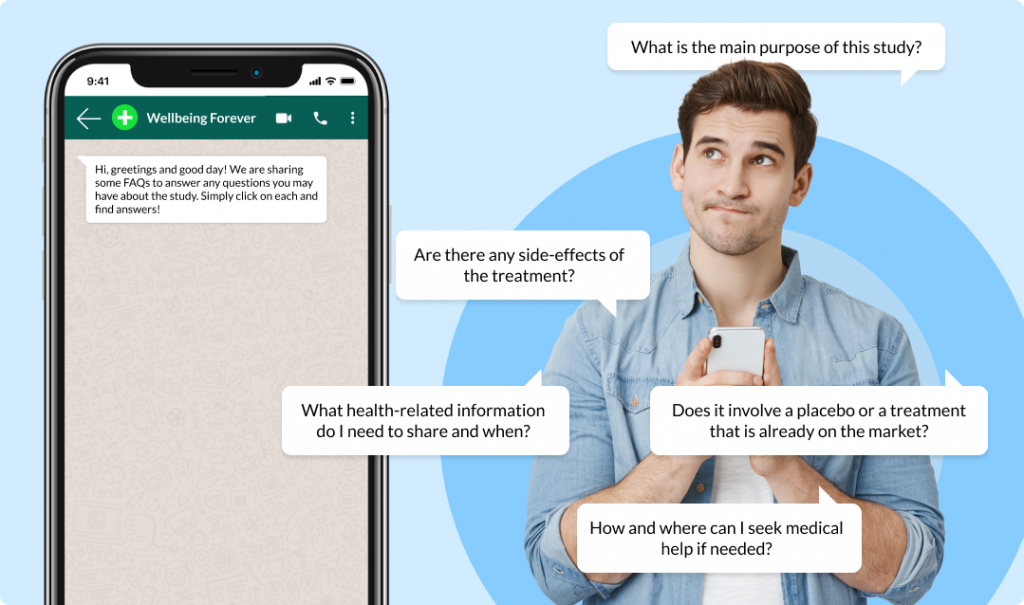
Use Case #4: Communication Between Doctors and Pharmaceutical Companies
Problem
All pharma company representatives need to meet doctors from time to time to apprise them about the latest drugs in the market, share literature on the latest publication findings and clinical case studies, and send other promotional brand content. Pharma companies also invite doctors to attend conferences and seminars related to their field of work. Such in-person meetings are highly time consuming even in the best of times, with doctors having to keep patients waiting to meet representatives, and the latter having to wait in long queues to meet just one doctor. This is simply not feasible during the Covid-19 pandemic, which has forced the healthcare industry to scale back all in-person meetings. However, such interactions must continue and so the industry has started relying more heavily on virtual engagements in the form of webinars, training videos, emails, etc. for sharing of valuable content. However, these channels have lower engagement rates and don’t provide real-time conversation possibilities.
Solution
To get doctors and pharma companies to interact on WhatsApp, so that the latter can provide relevant images, videos, literature, etc. to apprise doctors of new drugs being launched in the market from the company’s official WhatsApp account. Medical representatives can have face-to-face meetings with doctors via video interactions without having to travel, saving them time. Doctors can stay updated about latest drugs in the market and resolve any doubts they may have about a new medicine with the sales representative very easily.
Benefits
- Information is easily accessible
- Less time required for interactions
- Interactions fit into the doctor’s schedule easily
- Lowered travel costs
- On-demand and immediate response to doctor’s questions
- All webinar notifications on a single platform
- Easy to share with colleagues
- Direct interactions with doctors
Engaged Audience
- Doctors
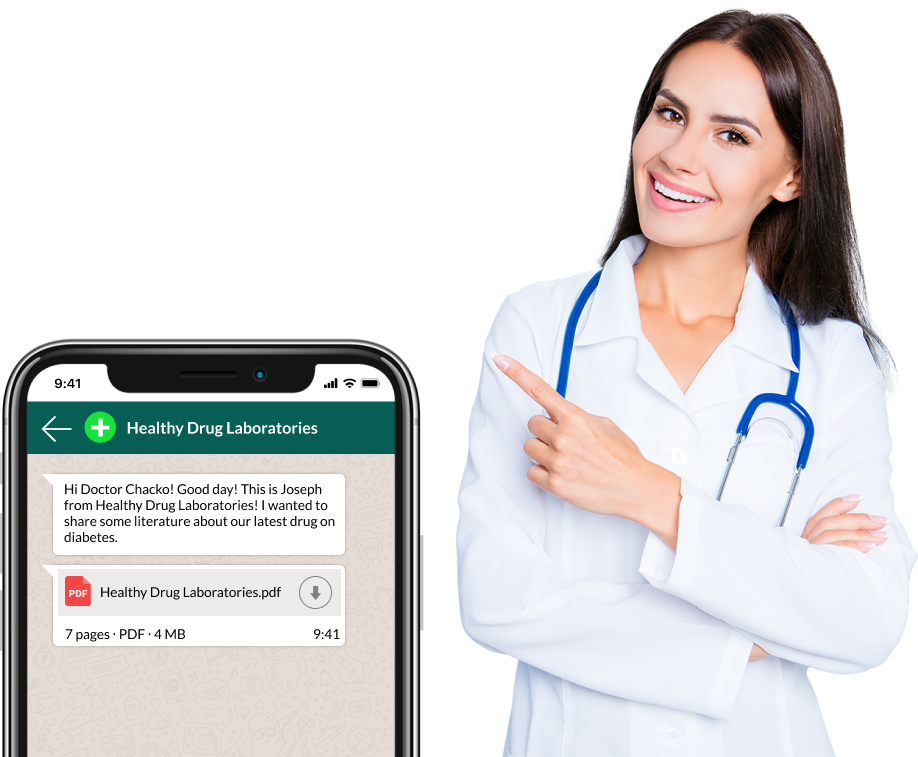
Onboarding Framework
Doctors and medical sales representatives who want to interact virtually
| Customer Need | To facilitate digital interactions between physicians and pharma companies |
| Communication Intent | Share information on new product launches, drug-related info, etc; enable physicians to ask questions about new products, enable medical sales representatives to connect with doctors |
| Channel | WhatsApp Business |
| Type of Communication | Two-Way |
| Mode of Communication | Triggered messages, live support for two-way communication |
| Trigger Messages | Trigger campaign to share whenever new product information is available; trigger follow-up according to sales representative’s schedules – monthly, quarterly, etc. |
| Conversion Goal | WhatsApp Opt-In and segmentation |
| edna Features Implemented | Inbound message routing, doctor’s database segmentation, WhatsApp Business API, edna chat center |
| Systems Connected | CRM, MR reporting software |
Clearly, the way forward for the healthcare industry is to proactively incorporate digital communication technologies in care delivery. Governments across the world are undertaking e-healthcare initiatives to improve the efficiency and effectiveness of public healthcare systems. Private players are also increasingly turning to digital technologies for healthcare delivery. This, coupled with the mobile revolution and easy access to the internet globally will help to bring down healthcare costs and benefit both patients and providers. WhatsApp, not originally intended to serve healthcare needs, will prove to be a formidable channel in improving the healthcare industry’s communication efficiency across a variety of use cases. Official platform providers like edna will act as a catalyst in helping healthcare institutions reach out to patients seamlessly.
edna is a leading digital communication solutions provider that is revolutionizing the way organizations connect and converse with consumers. For more than 15 years, we have been helping companies to use advanced communication technologies to orchestrate streamlined, programmatic omnichannel communications over all major social messengers, live web and in-app mobile chat, PUSH messaging and SMS. edna is an official service provider for WhatsApp Business, Apple Business Chat, and Viber for Business. We work with 550+ enterprise clients that include leading organizations in Retail, FMCG, Banking, Insurance, Air Travel, Telecom, Hospitality and Healthcare and process 4 Billion+ messages every month. Learn more about our offerings at edna.io
Submit details below to download white paper
Why Read It:
- See how WhatsApp business can be leveraged by medical clinics for gaining customers
- See how it enables effective communication between doctors and pharma companies
- Learn how it helps to maintain participant adherence in clinical trials
- Find out how it helps pharmacies deliver care at patients’ doorsteps



